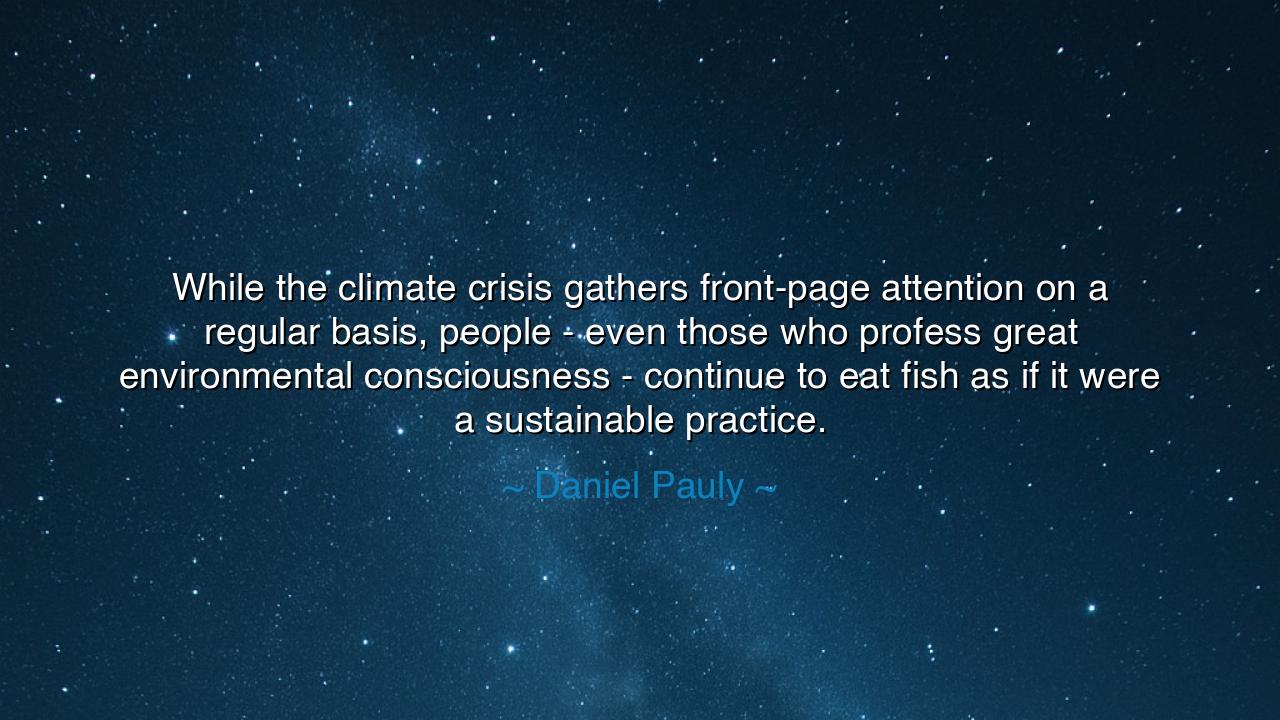
While the climate crisis gathers front-page attention on a
While the climate crisis gathers front-page attention on a regular basis, people - even those who profess great environmental consciousness - continue to eat fish as if it were a sustainable practice.






Hear now the voice of Daniel Pauly, sharp and unyielding as the sea wind: “While the climate crisis gathers front-page attention on a regular basis, people—even those who profess great environmental consciousness—continue to eat fish as if it were a sustainable practice.” Within these words lies a paradox of our age. For though men and women march for the planet, speak with passion of melting ice and rising seas, they yet turn blindly to their tables, consuming from the oceans as though the bounty were endless, as though the nets did not drag destruction behind them. His words cut through pretense, unveiling the gap between awareness and action.
To understand this truth, one must know the source. Daniel Pauly, a great scholar of the seas, has studied the decline of fisheries across the earth. He has watched as the once-teeming oceans have been emptied, as industrial fleets scour the depths, and as fragile ecosystems collapse beneath the weight of demand. His cry is not against the eating of fish alone, but against the blindness of those who imagine that their choices bear no cost. To say that fish is a sustainable practice in this age is to repeat an illusion, a comforting lie, while the sea herself grows barren.
History has already shown us this tragedy. In the northern Atlantic once swam the mighty cod, so abundant that sailors said they could be scooped up by the bucket. For centuries the cod sustained nations, its flesh feeding both rich and poor. Yet greed and overfishing prevailed. By the late twentieth century, the cod were gone, their numbers collapsed beyond recovery. Entire communities in Newfoundland fell into ruin, their livelihoods destroyed. The ocean had given her warning, but men did not listen until it was too late. Pauly’s words echo this lesson: what seems infinite today may vanish tomorrow, and consumption without restraint is the herald of collapse.
The deeper meaning of his warning is about hypocrisy. How easily do we speak of environmental consciousness, how proudly do we wear the garments of green, yet how slowly do we change the habits of our daily lives. It is easy to condemn distant industries, harder to examine the food upon our plates. Pauly reminds us that the true test of conviction is not what we proclaim in public, but what we choose in private. To cry out for the climate while devouring unsustainable fish is to speak with divided tongue, and divided tongues cannot shape a united future.
The ancients too taught this. In their myths, those who took more than their share from nature were punished. The Greeks told of Erysichthon, who cut down a sacred tree despite the goddess’s warning. For his greed, he was cursed with endless hunger, devouring all around him until he consumed himself. So too is the modern eater warned: to ignore the limits of the sea is to invite famine upon oneself and one’s children. For nature is not an endless servant, but a living covenant, and betrayal of that covenant carries a terrible cost.
The lesson for us is plain: true environmental consciousness demands sacrifice. If we would save the seas, we must eat less from them. If we would preserve the earth, we must align our plates with our principles. There is no room for illusion in an age of crisis; only consistency and courage will suffice. Each meal is a choice between life and decline, between the living ocean and the empty net.
Therefore, take practical action: learn the sources of your food; refuse what is unsustainable; choose plant-based meals more often; support fisheries proven to replenish rather than exhaust. Teach your children that the ocean is not a larder without end, but a living realm deserving reverence. For every fish spared today is a seed for tomorrow’s abundance.
So let Pauly’s words burn within you: “People… continue to eat fish as if it were a sustainable practice.” Do not let them be only a condemnation of others—let them be a mirror to yourself. Rise above hypocrisy, live in harmony with your words, and let your choices honor the seas. For when the oceans thrive, humanity thrives; but when the oceans fall silent, all the world will mourn.






AAdministratorAdministrator
Welcome, honored guests. Please leave a comment, we will respond soon